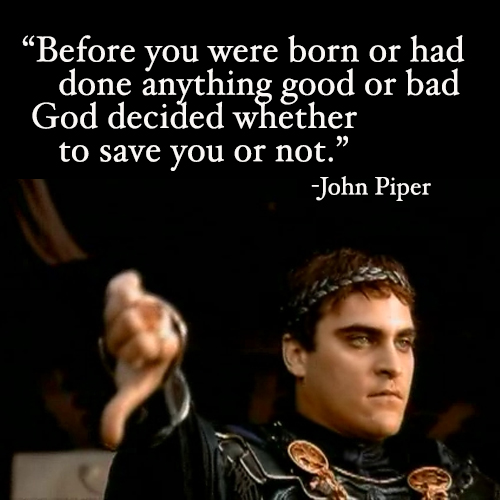“Unconditional election is God’s free choice before creation, not based on foreseen faith, to which traitors he will grant faith and repentance, pardoning them, and adopting them into his everlasting family of joy.” – John Piper
Once upon a time, I stopped believing in God because of unconditional election.
I couldn’t get over the question of why God would continue to create people that He already has chosen not to elect to salvation? That question, mixed with too-easy answers, wrecked my faith when I was in college. You can read my story here: “The Day I Stopped Believing in God”
As I’ve told this story to people from various Christian traditions over the years, I’ve often heard the response: “Well, those questions and answers were hardly representative of John Piper. Perhaps you were interacting with a straw man of Calvinism.” Desiring to be gracious and charitable, I determined to give them the benefit of the doubt. Maybe I had misunderstood the theology, or maybe it had become twisted in the second-hand telling I heard.
But this morning as I wandered the kitchen in my pajamas searching for hot coffee, I stumbled across this post from John Piper at Desiring God that so clearly articulated these problematic views: “Five Reasons to Embrace Unconditional Election”
I certainly am no theologian, and have no ability or desire to interact with Mr. Piper’s ideas point by point. What I can tell you is that the picture of God painted by his brush strokes is, in my experience, damaging to Christians and dishonoring to God. I’ll leave the Biblical critique to those more qualified than myself, but these are some of the implications of this unconditional election that I find not only personally troubling, but incompatible with God as revealed in Jesus through Scripture:

1. If unconditional election is true, salvation is an arbitrary lottery.
I affirm the sovereignty and omniscience of God while acknowledging I don’t understand how it all works. Yet I’m very uncomfortable with the idea that God’s election is “not based on forseen faith”. If it is God’s “free choice” of what “traitors” he will “pardon” and “adopt”, I can see no way to understand this other than as purely arbitrary.
Mr. Piper also states, “Before you were born or had done anything good or bad, God chose whether to save you or not.” While I appreciate that this view of salvation is not based on our merits, it seems to paint God as random and capricious. Regardless of how we understand sovereignty or free will or salvation, it implies that God picks and chooses favorites for no apparent reason.
2. If unconditional election is true, God’s creation is an act of cruelty.
For the sake of discussion within this framework, how many souls should we presume have “embraced the Savior”? Five percent of humanity? Ten percent? Even if we’re generous and suppose that twenty percent of people who have ever lived have “believed on the name of the Lord Jesus Christ” and been saved, that means eighty percent of everyone who has ever lived never even had a chance to be “saved”.
If God chose before the foundation of the world who He would save and who He would not save, then it is an act of unimaginable cruelty to create those people He has already chosen not to save. They never have any hope of anything other than eternal conscious torment. If God, who is in control of every aspect of the universe, chooses to create people He has not also chosen to elect, is He not simply creating human firewood destined only to stoke the flames of hell forever?
3. If unconditional election is true, loving my neighbor is an unfair demand.
I believe that God loves the whole world so much that He made a way for anyone to enter into eternal life. This seems to stand in strong contrast to a version of God who would make a way for only the pre-selected few to be adopted “into his everlasting family of joy”.
This leads me to wonder, if God only loved a few enough to save them from hell, why should I love my neighbor? Statistically speaking, God probably didn’t love him enough to choose him to be part of God’s family before the foundation of the world, so why should I care about him during these few brief years before he’s sent crackling into hell (presumably for God’s glory)?
Furthermore, to “share the Gospel” with my unsaved neighbor would be quite difficult. If I was theologically honest, I’d have to say: “God randomly chose some people millennia ago to be part of the family, and the rest He’s destined to eternal torture. Let’s both hope you’re one of the chosen ones, but there’s really nothing you can do about it either way. Good luck in the afterlife!”
That is not good news.
4. If unconditional election is true, our natural response will be survivor’s guilt.
When I even briefly entertain this notion of unconditional election, I’m overwhelmed by the unfairness of it all. Why should I be saved and others damned? If there really is no reason beyond “God’s free choosing”, I’m just one of the few lucky ones, a survivor of God’s fierce wrath.
What’s truly troubling to me about this is that I’ve heard Christians celebrate this unfairness, calling it “grace”. As if there was somehow something good about being randomly selected to receive “pardon”. As if the arbitrariness of it makes it more precious. I don’t see how there’s anything good in this.
If I hate the thought of most of humanity being passed over in the divine lottery and predestined to hell, then surely God – whose mercy is higher and deeper than my own – must desire their salvation even more than I do.
5. If unconditional election is true, God cannot be trusted.
Suppose this is true, that “before you were born or had done anything good or bad, God chose whether to save you or not.” If I believed that, I’d be terrified to have children. I’d live in constant fear that perhaps they weren’t chosen before they were born, and they will be damned to fiery torment no matter how much I love them and try to point them to Jesus.
If this is true, I don’t think I would even pray to God about anything, because if He didn’t care enough about most of His creation to save them, why should He care about anything in my life?
If this is true, how can I lift my hands or my voice to praise a God who doesn’t want to save all creation? How could I call a God “good” or “beautiful” or “loving” if I truly believed that His redemptive work is reserved for a few favored recipients?
How could I believe that this story we’re living has any meaning, if our eternal destiny is based only on the roll of the dice in the hands of a God who is too small or too self-absorbed to adopt everyone?
I don’t know how salvation and free will work, and I don’t pretend to. But if our free will allows us to choose hell instead of heaven, I have to believe that it breaks God’s heart every time. I believe in a God who would lay down life for His creation, who joins us in our brokenness and begs us to join Him in eternal life.
I can’t accept that God would choose a few and then choose that the rest should perish as part of his plan. This is not about theories of sovereignty or election. This is about the very nature of the God, and whether or not He cares about His own creation, all of us. I have to believe that He does.
So what now?
I’ve read all the verses and heard all the arguments and am convinced that unconditional election as presented by Mr. Piper is deeply flawed. I believe that it paints a picture of a monstrous God who I do not recognize as Jesus. I can’t accept this as “what the Bible says”. I can’t accept the argument that “God doesn’t have to hold Himself to our standards”. If Christianity is worth anything at all, I must believe that God is more compassionate, more merciful, more loving than I am. I refuse to redefine love to match a twisted view of God patched together from scattered Bible verses.
The only thing left to do is go back to the Scripture and read it again, differently, until I can find a God there who reflects the two truths I know to be certain: That God is like Jesus, and that at the core of His being God’s essence is love.
Disclaimers: I acknowledge that there is much nuance in Reformed thinking, and that John Piper is not representative of the whole. I realize that Mr. Piper may not affirm my five statements. I am not suggesting that he would. Rather, these statements are logical conclusions arrived at by following the ideas put forward in his recent blog post. I hope that my words would encourage those who share Mr. Piper’s views to consider whether they are the best way to show the nature of our God. Because these teachings have been so damaging to my own faith and to the faith of others, it’s important to wrestle with them and read Scripture again and find a better picture of God that is consistent with Jesus as revealed in the Gospels.
If you’re looking for a good explanation of predestination/election, see the Epilogue from Pastor Jonathan Martin on this post.
If you you’re wondering why I chose not to include Biblical support for my ideas, see this: “Beware of Thinking Biblically”
[ image: Tim Hamilton ]
published July 13, 2013
subscribe to updates:
(it's pretty much the only way to stay in touch with me these days)

